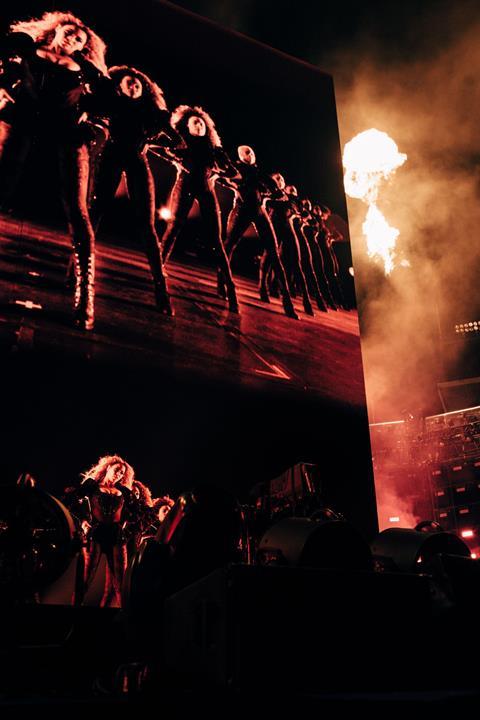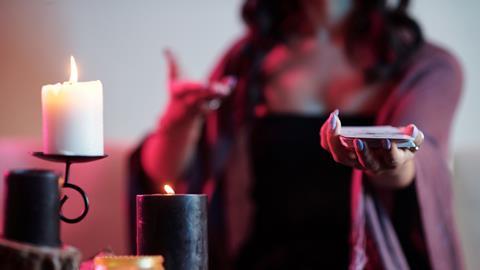Hope Bonarcher looks at the rising trend of occult practices in our culture, fuelled by female celebrities promoting being a witch as the ultimate freedom
Our world is crying out for safety; yet instead of looking to our heavenly Father, vast numbers of individuals are running to the ever-growing trend of witchcraft and the occult for comfort. For example, #witchtok is currently trending on TikTok, with over 30 billion posts of content.
This is so far removed from what God intended for us. In 1 Samuel 15:23, he equates rebellion with witchcraft. Generally defined, witchcraft is the activity of performing magic to help or harm people. From literally the beginning of time, humanity has gone to created means and sources to meet its felt needs. These created things can be imbued with demonic power (like the snake in Eden), leading people to believe in and even worship these powers in lieu of the one true God. There’s no direct translation in Hebrew, but many practices commonly associated with witchcraft are condemned in scripture. Fortune telling, sorcery, interpreting omens, casting spells, functioning as mediums or psychics, calling forth the spirits of the dead; every practice entails seeking wisdom, direction, insight or leverage from some source separate from God.
Marcia Montenegro, former astrologer, New Age expert and author of the helpful reference pamphlet, Christianity, Cults and The Occult, explains the broad umbrella of neopaganism as a revival of generally polytheistic, ancient pagan practices, including witchcraft. Neopaganism also involves Dianic goddess worship; Yoruba cosmology from Nigeria and Western Africa; Santeria (a religious tradition that originated in Africa and was developed and spread through Latin America which blends occult practice with Catholic imagery), Celtic witchcraft, which is closest to the forms of witchcraft and Wicca (witchcraft’s create-your-own brand, younger sister) we’re familiar with in the UK. One thing these ancient practices have in common is a strong reliance on connecting with the earth and nature specifically as mother (Mother Earth, Mother Nature) or literally through worship of the earth as a goddess. Opposing the biblical concept of the protective, omnipresent Father is its emphasis on female power, and feminine energy. Although men do practice witchcraft – there are male shamans, witch doctors and sorcerers – there is a wider understanding of the concept of witchcraft as feminine. A popular, modern acrostic delineates a witch as a “Woman In Total Control of Herself.”
The seeping influence of witchcraft today
You may have noticed your local bookshop includes titles like The Practical Witch’s Spell Book, The Little Book For Modern Witches, Inner Witch, the Modern Witchcraft series and Little Magic Rituals. In music, Florence and the Machine’s latest album Under Heaven or Hell has a track list of titles like ‘Which witch’, ‘Third eye’, and ‘Girls against God’. Lead singer, Florence Welch, described to Vice magazine how she started a coven in middle school. Rapper Azealia Banks made headlines when she schooled her Instagram followers on her three-year practice of sacrificing chickens for Santeria, with the gory blood and feather soaked background of her closet walls to prove it. In a recent interview on The Zach Sang Show, Ariana Grande emphatically substantiated herself as “a literal witch…the witchiest witch,” giddily relating the Tarot card readings she does for her fellow Wicked cast members.
From literally the beginning of time, humanity has gone to created means and sources to meet its felt needs
Christians are not immune. Many Christians revelled in attending Taylor Swift’s Eras tour. However, with the release of a remix to her song ‘Willow’, she boldly tweeted, “It’s me. I’m witches. Never fear, the ‘Willow lonely witch remix’ is here.” As if to double down on her statement, Swift performs ritualistic choreography, dressed with her dancers as a coven of darkly cloaked witches on stadium stages across the world.
On an early album with her girl group, Destiny’s Child, Beyonce and co sing a stirring acapella rendition of ‘Amazing Grace’ and in the documentary Life is But A Dream, the singer gives thanks to Jesus, affirming the faithful prayers of her mother and grandmother and their Methodist Christian faith. “God is real and God lives inside of me and inside of all of us and it doesn’t matter where I am, I know that and I feel it.” More recently, Beyonce has become especially forthright in songs like ‘My Power’ and ‘Black Parade’, confident in a force that comes from charging her crystals and celebrating her Oshun and Yemaya energy (both considered powerful goddesses in the traditional religion of Yoruba culture).
The #MeToo movement gave voice to the collective angst and vulnerability of women everywhere over abuse of power at the hands of oppressive men, demanding ‘down with the patriarchy’. The idea of gaining control through goddess worship, divine feminine energy and sex magic, is like a mystical power tool giving women the upper hand. Beyonce’s song ‘Run the World (Girls)’ is anthemic to the age. The desire to manipulate, yielding divine retribution through sorcery and love spells, can also be heard in Cardi B, Megan Thee Stallion and Sabrina Carpenter’s music. They all promote the ability to overcome the stronger sex through the intangible sway of the feminine. Reliant trust in an invisible everlasting Father takes faith and risks vulnerability; it’s tempting to find strength in completely self-started, feminine-powered manipulation.

The church girl who became a witch
Dr Sarita Lyons, psychotherapist and director of discipleship and women’s ministry at Epiphany Fellowship Church in Philadelphia, has written a book called Church Girl (Waterbrook Press), in which she shares her journey growing up as a pastor’s daughter who turned to ancient practices from traditional Yoruba culture when she went to university. In an interview on ‘The Best Kept Secret’ podcast with Liv Dooley, she jovially described her younger self as the type of Christian who’d get “suspended for handing out Bible tracts at school”. But growing up in a Christian bubble, unschooled in responding to challenges of her faith, she experienced spiritual vulnerabilities when she moved to study at university. In an attempt to heal from the heartbreak of a broken relationship, Lyons sought worth and identity in her school community, but her Christian faith was unwelcome as part of the package. She explains that for her there was a gradual process of syncretism, “the blending of opposing theological faith practices that really are incompatible”.
A popular, modern acrostic delineates a witch as a “Woman in Total Control of Herself.”
In her words, “[God] has the right to declare ownership over his creation.” Too often we as believers feel “God is slow to give me what I want, so let me go outside of the boundaries He has ordained to get it in my own way, add to my faith something that is illegitimate.” Her Bible began to sit alongside the different idols she learned to worship, but, eventually, the Bible lost its place. She ascribes her own pride to the fact that she was unprepared to struggle so much with sin when she went out into the world. It was as if she was unconfident in the identity and grace bestowed upon her by the Father: “I’d rather become a witch than a sinning church girl.” She admonishes us as Christians not to be afraid to ask ourselves hard questions. Are we churched but biblically illiterate? Do we understand the gospel and how to communicate it well? Are we living a life of faith or living life off a few scriptures? And are we living a life of community, avoiding isolation?
The resolution of Dr Sarita Lyons’ experience wasn’t in the power of a goddess to deliver her from heartache while backslidden, but in the heartfelt prayers of her pastor father. When an old friend told her parents of her troubling spiritual developments, Lyons’ father began calling and leaving long prayers on her answering machine. “I would push play and all I would hear was, ‘Father God, in the Mighty Name of Jesus, I plead the blood over Sarita right now, Lord God! I evict every demonic spirit!’ I mean, he went in!…And I actually listened. I would never just delete it, which is why I knew, looking back, God was drawing me back to Him.” Lyons’ father’s heart, modelled after the Father heart of God, was to war on behalf of his daughter, ultimately the chains that bound her through witchcraft were miraculously broken.
In his article, ‘Why the Bible Calls Women Sons of God’, John Beeson writes, “in the ancient world, Israel included, only sons received the family inheritance. Daughters received no inheritance. They were dependent on their husband or the care of their family. If the biblical authors referred to men and women as ‘sons and daughters of God,’ then, their readers might have mistakenly presumed that only men received a spiritual inheritance from God. By exclusively referring to all the children of God as ‘sons of God,’ then the biblical authors are saying something profound: men and women are equal recipients of the inheritance of the Father.” We are not orphans, but God’s chosen children. If rebellion is as witchcraft, sonship is his remedy.
Listen to Dr Sarita’s interview with podcast host Liz Dooley, How God Saved A Church Girl from Witchcraft here


































No comments yet